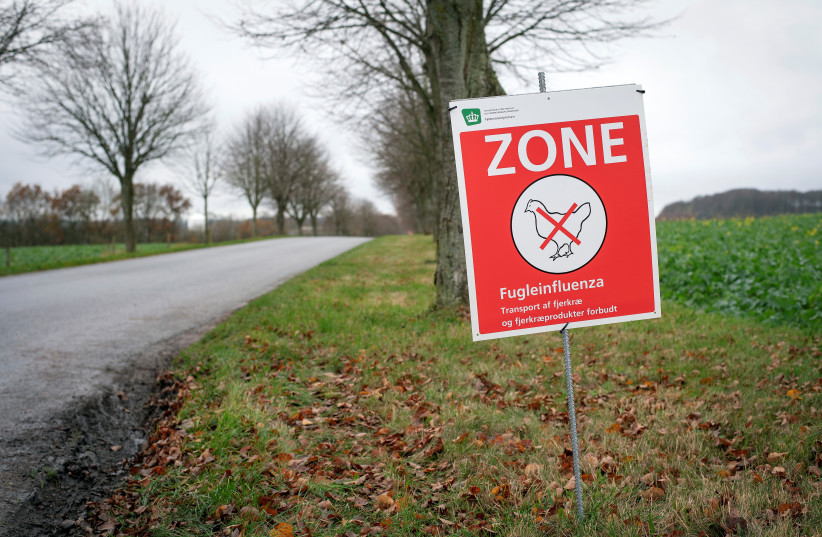An outbreak of H5N1 avian influenza was found at a farm in the town of Ne'ot Golan in southern Golan Heights on Tuesday as cases continued to rise around the world.
About 17,000 turkeys are located at the affected farm, which has been quarantined by the veterinary services of the Agriculture Ministry. The suspicions of a possible bird flu outbreak at the farm first rose after an unusual death rate was noticed among the birds at the site.
"We are in a war against a virus that may not be visible but is deadly to birds, and can be contagious to humans as well," said Agriculture Minister Oded Forer. "Although cases of infection in humans are rare, they are extremely fatal, with about 50% mortality in humans who have been infected with the disease."
The ministry is conducting tests at all farms in the area and in northern Israel in general, after an outbreak of bird flu was found among cranes in the Agamon Hula lake last week. The Agamon Hula site has since been closed to visitors until further notice due to the outbreak. About 100 birds have died in the outbreak in the Agamon Hula lake.
On Sunday, an outbreak of the bird flu was found in the town of Margaliot in northern Israel. The affected farm was quarantined and the sale of eggs from the farm and from selection stations that received the eggs was halted.

The farms affected in Margaliot provide about six million eggs per month to the local market, out of the about 200 million eggs used each month in all of Israel. A suspect has been summoned for questioning for smuggling eggs away from the affected farm.
Hundreds of thousands of birds migrate through Israel on their way to Africa during this season, raising the risk of bird flu outbreaks. The Agriculture Ministry has called on all farmers to follow directives and ensure that their birds are kept separate from wild birds.
Since 2006, there have been cases of bird flu detected in Israel almost every year.
Amid the spike in bird flu outbreaks, the Health Ministry stressed that the public should only buy poultry and eggs from regulated places and ensure that eggs have a seal of inspection. The public should also make sure to properly, hygienically and thoroughly cook poultry and eggs and should keep distance from wild birds.
A high number of bird flu outbreaks have been reported throughout Europe, Africa and Asia in recent weeks, mostly due to the H5N1 subtype, according to the World Organization for Animal Health (OIE).
The World Organization for Animal Health (OIE) has urged countries to increase surveillance for high pathogenicity avian influenza (HPAI) outbreaks, as the virus has been reported in over 40 countries since July.
The H5N1, H5N3, H5N4, H5N5, H5N6 and H5N8 subtypes of HPAI are circulating in bird and poultry populations across the globe, sparking concern at OIE which called this an "unprecedented genetic variability of subtypes...creating an epidemiologically challenging landscape."
The UK's Animal and Plant Health Agency reported on Monday that the UK is suffering from the largest bird flu outbreak it has ever experienced.
"It is critical that countries notify outbreaks in a timely manner to the OIE, to ensure an accurate monitoring of the evolution and spread of this transboundary disease," said the OIE. "Countries will also be requested to report infections with low pathogenicity avian influenza viruses identified in domestic and captive wild birds and that have proven natural transmission to humans associated with severe health impacts."
Since the beginning of December, six new cases of human infection of HPAI have been reported to the World Health Organization. All of the reported cases were from China and included one case with the H9N2 subtype and five cases with the H5N6 subtype.
The increase in human infections caused by the H5N6 subtype of avian influenza is causing concern among experts, who say that a previously circulating strain appears to have changed and could be more infectious to people.
"The increase in human cases in China this year is of concern. It's a virus that causes high mortality," said Thijs Kuiken, professor of comparative pathology at Erasmus University Medical Centre in Rotterdam, to Reuters.
In most of the cases, the animals had come into contact with poultry, and there are no confirmed cases of human-to-human transmission, the WHO noted, which highlighted the rise in cases in a statement on Oct. 4. It said further that an investigation was "urgently" required to understand the risk and the increase in spillover to people.
"It could be that this variant is a little more infectious (to people)...or there could be more of this virus in poultry at the moment and that's why more people are getting infected," said Kuiken.
Reuters contributed to this report.
